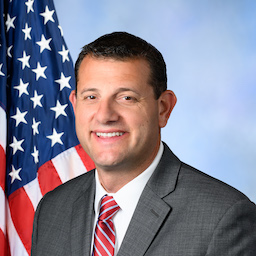- Home
- About
-
Services
- Art Competition
- Community Project Funding Map
- Congressional App Contest
- Congressional Certificate
- Event Request
- Flag Request
- Grants
- Grant Letters of Support
- Help with a Federal Agency
- Inauguration
- Internships
- Kids Page
- Meeting Request
- Service Academy Nominations
- Tour Requests
- Vietnam Veteran Commemoration
- Government Shutdown FAQ
- Issues
- Media
- Contact

Press Releases
Congressman Valadao Requests Answers for Central Valley Small Businesses
Washington,
January 9, 2024
|
Faith Mabry
Congressman David G. Valadao (CA-22) sent a letter to the IRS Commissioner requesting answers on processing delays impacting small businesses in California. The Employee Retention Tax Credit (ERTC) was enacted during the COVID-19 pandemic to help businesses keep people employed during the pandemic.
WASHINGTON – Today, Congressman David G. Valadao (CA-22) sent a letter to the IRS Commissioner requesting answers on processing delays impacting small businesses in California. The Employee Retention Tax Credit (ERTC) was enacted during the COVID-19 pandemic to help businesses keep people employed during the pandemic. However, the IRS has experienced significant issues with the processing of legitimate ERTC claims and in September, issued a moratorium of processing any new claims. This has been a huge issue for businesses who filed legitimate claims and are patiently waiting for their refunds. “I am concerned that honest small businesses owners, many of whom have made financial decisions based on the availability of this tax credit, have been kept in the dark about the status of the ERTC program,” wrote Congressman Valadao. Rep. Valadao requested answers from the IRS on what actions the agency is taking to address concerns of small business owners in his district, including:
Read the full letter here or below: Dear Commissioner Werfel, As the Internal Revenue Service (IRS) prepares for the 2024 tax filing season, I have concerns regarding the status of the Employee Retention Tax Credit (ERTC) program and how processing delays are impacting many of the small businesses in my district. The ERTC has been a vital initiative for our nation’s small businesses who were harmed by the COVID-19 pandemic by providing eligible employers with a tax credit for wages they paid to their employees during the pandemic. Since the establishment of this tax credit program the IRS has experienced significant issues with the processing of legitimate ERTC claims, many of which were identified in a letter sent to you by my colleagues, House Ways and Means Committee Chairman Jason Smith and Oversight Subcommittee Chairman David Schweikert on October 3, 2023. I share the concerns expressed by my colleagues. On September 14, 2023, the agency announced an immediate moratorium on processing new claims through at least the end of 2023 amid concerns that a large number of claims were potentially fraudulent. However, the agency stated that claims received before September 14, 2023 would continue to be processed with a processing goal of 180 days. Despite this statement, I have heard from small business owners in my district who filed for this credit well in advance of the September cutoff and have been unable to receive even an update from the IRS on the status of their claim. Many business owners believe the agency has stopped processing ERTC claims altogether. Last month, the IRS issued a press release stating that more than 20,000 letters had been sent to employers notifying them that their ERTC claim was disallowed. While I am pleased with the agency’s focus on identifying potentially fraudulent claims and investigating bad actors, I am concerned that honest small businesses owners, many of whom have made financial decisions based on the availability of this tax credit, have been kept in the dark about the status of the ERTC program.I respectfully request answers to the following questions by January 31, 2024: 1. What steps has the IRS taken during the months-long moratorium to ensure that legitimate ERTC claims are being processed and paid as quickly as possible? 2. How many claims filed before the September cutoff were processed and paid during the moratorium? 3. During the time the agency spent identifying ineligible ERTC claims and mailing disallowance letters to taxpayers, did the agency continue to approve and pay eligible claims? If not, why not? 4. When can businesses who filed an eligible claim before the September cutoff expect to receive these funds? Has the agency determined a timeline for businesses that filed during the moratorium or have yet to file a claim? 5. How is the agency working to identify and investigate potentially fraudulent claims that were made by employers who were scammed by credit promoters? How does the agency plan to hold bad actors accountable and increase protections for future filers? 6. How is the agency communicating the current processing status to small business owners who have submitted claims? 7. What action(s) can Congress take to help address these issues in future tax credit programs, specifically in regard to closing loopholes that allow fraudulent claims to be filed in the first place, protecting small-business owners from ill-intentioned credit promoters, and ensuring the timely processing of tax credits like the ERTC? Thank you for your attention to this matter. I look forward to your response and working together on behalf of our nation’s hard-working small businesses.### |

